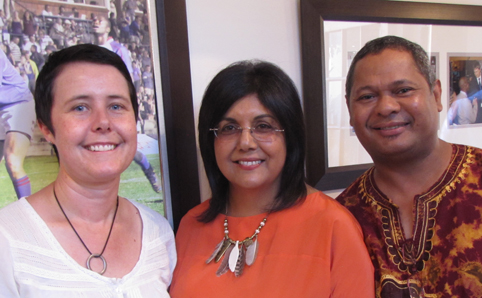Latest News Archive
Please select Category, Year, and then Month to display items
12 January 2024
|
Story Nonsindiswe Qwabe
|
Photo Sonia Small
 Since joining the UFS in 2008, Dr Grey Magaiza has worked extensively on approaches that can foster the socio-economic transformation of societies.
Since joining the UFS in 2008, Dr Grey Magaiza has worked extensively on approaches that can foster the socio-economic transformation of societies.
“The future should be one where communities can decide on their development agenda and futures. That’s the most important for me.” Dr Grey Magaiza, Deputy Director of the Centre for Gender and Africa Studies (CGAS) and Head of the Community Development programme on the Qwaqwa Campus, is passionate about capacitating communities to be agents of change and advancement. His vision for the future emphasises the empowerment of communities to take charge of their development by actively participating in decision making and the implementation of development projects that can improve their lives.
Since joining the UFS in 2008, Dr Magaiza has worked extensively on approaches that can foster the socio-economic transformation of societies. Over the years, he has crafted his research speciality into one that he is most proud of – being an interdisciplinary scientist immersed in the development of communities.
“I’m in a fortunate position of researching what I like. I say ‘fortunate’, because I’ve taken the time to understand what I’m passionate about, which is the overall field of rural livelihoods and livelihood futures – in short, community development. My research starts from an engaged university, understanding the elements that a university must use to enhance transformation and relevance to its immediate community in terms of development.”
One of the ways he has done this is by looking at social entrepreneurship as a development approach for young people in a rural setting. Through workshops with non-profit and civic organisations in Qwaqwa, Dr Magaiza has been helping these organisations to map out their needs and actively meet them through the involvement and support of external role players.
“We understand that communities are part of the national development agenda, but even that national agenda respects community knowledge and intentions and allows communities to shape their identity. A critical enabler of this is community organising. You bring back the capacity in communities to have dialogues on issues affecting them as spaces for engagement, knowledge exchange, and for people to just talk about their way forward.”
By enabling communities to define their development agenda, they can address their specific needs, challenges, and aspirations, he said. “When I look at livelihood futures, it’s quite an exciting aspect of my work – it’s like looking into a fortune tellers’ globe, because you’re not deciding for communities what they should do, but the communities themselves take those decisions.”
‘We need a story that will excite us all’
2012-03-09
 |
|
Attending the conversation were, from the left: Willemien Marais, Lecturer in the Department of Communication Science; Zubeida Jaffer; and Prof. Andre Keet, Director of the International Institute for Studies in Race, Reconciliation and Social Justice.
Photo: Amanda Tongha
9 March 2012
|
“From the stories of Afrikaner Nationalism and Black Consciousness to the stories of our Constitution and the 1995 Rugby World Cup… But now what do we have?”
This was the question posed by Zubeida Jaffer, recently appointed as the university's Writer-in-Residence. Do we need a new national narrative? was the issue addressed by Ms Jaffer in a talk presented as part of the Critical Conversations series hosted by the university’s International Institute for Studies in Race, Reconciliation and Social Justice. Ms Jaffer is an award-winning journalist and author of, amongst others, Love in a time of treason and Our Generation.
“We can’t change the past and we can’t keep on focusing on separate narratives; we need to find a story, a new national narrative with elements that could excite all of us,” she told an audience consisting of academics and students. She also referred to the changes that took place at the university. “I’m fascinated by what is happening here. It’s mind-boggling to see the changes.” Based on the UFS’ drive to find common ground, Ms Jaffer told the audience that research at universities could and should direct this search for a common South African story.
In reference to her own experiences as a community activist and journalist during apartheid, she urged students to become active citizens. “In my time students were the leaders; they gave direction to the national debate.”
Article (pdf format)